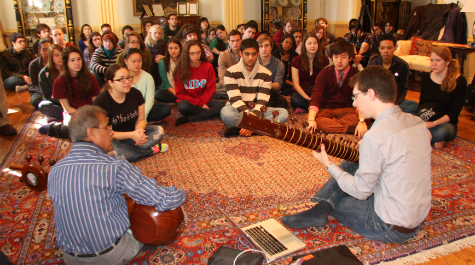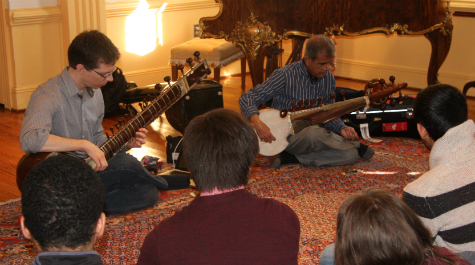East meets West in class with sarod master
Students and faculty who visited the Reves Center last Thursday had the opportunity to expand their musical horizons at a master class given by sarod master Irfan Khan.
Khan, a member of a prestigious family of musicians, recently toured the United States with students and faculty from the Afghanistan National Institute of Music, the only music institute in that country since the end of the Taliban’s ban on music. At the conclusion of the tour, which included performances at places like Carnegie Hall and coverage by national news outlets including the New York Times, Khan conducted a one-week residency with the W&M Department of Music, lecturing in classes, performing a concert and hosting Thursday’s master class.
{{youtube:medium:left|2LbET9zJqQ4, W&M master class with Irfan Khan}}
During that event, Khan and Assistant Professor Max Katz discussed the process of learning their two instruments, the sitar and sarod, life in India for musicians and the differences between East and West in terms of musical theory.
Indian classical music, unlike Western music, is not written down, the two said. Where European performers learn from sheet music, have lessons with professors or teachers and then spend most of their time practicing on their own before they begin to play, Indian performers have a much different way of learning their instrument.
“It’s mostly improvisational,” said Katz, a student of Khan’s on the sitar. “You have to learn it with a teacher. You can’t pick it up from a book. You have to learn it all through your teacher by playing phrases back and forth, sort of ‘catching phrases’ from your teacher. You have to learn how to move between the notes. You have to learn how to make it beautiful.”
Khan described his process of learning the beautiful Indian instrument from his father and uncle.
“Every morning I would wake up at five,” he recalled. “I would make tea for my teachers, my uncle or my father, and then we would begin to practice.”
They would practice together for 14 hours a day -- breaking for food and school -- for many years before Khan became the master of the instrument that he is today.
The master class was not limited to strictly music. After a performance by Katz and Khan of one of the traditional Indian ragas, or melodic modes, the floor opened up for questions from the audience. One student asked if there were elements of elitism left over in the Indian music world from the hereditary caste system.
“Absolutely not,” Khan responded. “Not anymore. Anyone can learn and perform the sitar or sarod. Before, only a small number of people were able to play, and then only for royalty. Now this is music for the masses. Everyone can enjoy it.”
Joe Corliss ’14 was one such person.
“I think it’s really cool that we get a chance to hear this kind of music,” he said. “Like, it’s really cool to see this Western professor getting taught by an Indian master. It’s a meeting between East and West.”

















